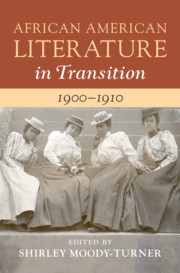Book contents
- African American Literature in Transition, 1900–1910
- African American Literature in Transition
- African American Literature in Transition, 1900–1910
- Copyright page
- Contents
- Figures
- Contributors
- Preface
- Acknowledgments
- Chronology, 1900–1910
- Introduction
- Part I Transitions in African American Authorship, Publishing, and the Visual Arts
- Part II New Negro Aesthetics and Transitions in Genre and Form
- Part III Modernist Masculinities and Transitions in Black Leadership
- Part IV Remapping the Turn of the Twentieth Century
- Chapter 10 Can the Black Subaltern Speak?
- Chapter 11 Race and Manhood in African American Representations of the Frontier
- Chapter 12 Narratives of Black and Chinese Citizenship after Plessy v. Ferguson
- Chapter 13 Black Transpacific Culture and the Migratory Imagination
- Index
Chapter 10 - Can the Black Subaltern Speak?
Alain Locke, Paul Laurence Dunbar, and a Theory of American Literature
from Part IV - Remapping the Turn of the Twentieth Century
Published online by Cambridge University Press: 29 April 2021
- African American Literature in Transition, 1900–1910
- African American Literature in Transition
- African American Literature in Transition, 1900–1910
- Copyright page
- Contents
- Figures
- Contributors
- Preface
- Acknowledgments
- Chronology, 1900–1910
- Introduction
- Part I Transitions in African American Authorship, Publishing, and the Visual Arts
- Part II New Negro Aesthetics and Transitions in Genre and Form
- Part III Modernist Masculinities and Transitions in Black Leadership
- Part IV Remapping the Turn of the Twentieth Century
- Chapter 10 Can the Black Subaltern Speak?
- Chapter 11 Race and Manhood in African American Representations of the Frontier
- Chapter 12 Narratives of Black and Chinese Citizenship after Plessy v. Ferguson
- Chapter 13 Black Transpacific Culture and the Migratory Imagination
- Index
Summary
This chapter identifies an alternative trajectory for tracing Alain Locke’s role in shaping the New Negro movement of the 1920s. As argued, Locke’s development as a theorist and architect of the New Negro movement can be traced back to the first decade of the twentieth century when Locke “swerved” away from the notion of the individual artist as “genius.” Locke found inspiration in Paul Laurence Dunbar, who himself had moved away from the notion of artist as genius to that of artist as “representative poet.” In particular, through this engagement with Dunbar, Locke formulated a notion of a race tradition rooted in intellectual influence and in the cultural and literary material that constitute an archive, which could stand in for an absent independent physical nation. This innovative notion laid the groundwork for the definition of the modern artist of the twentieth century, launching, in effect, a new theory of literature and the work that it does in the world.
Keywords
- Type
- Chapter
- Information
- African American Literature in Transition, 1900–1910 , pp. 249 - 272Publisher: Cambridge University PressPrint publication year: 2021

